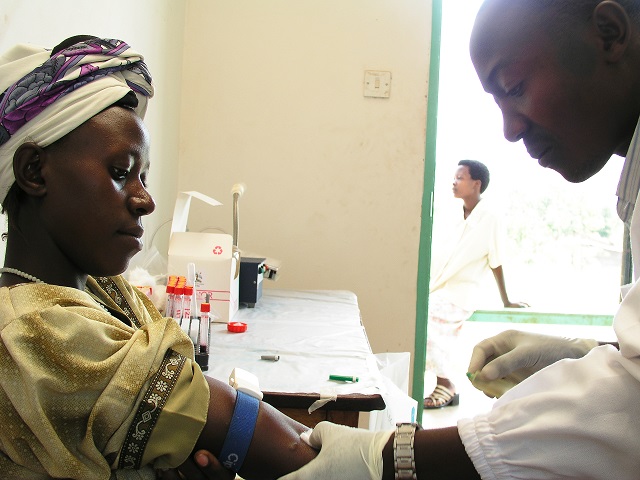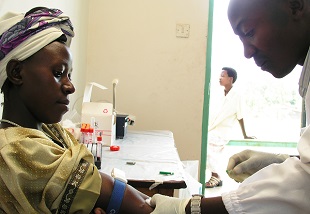
Study reveals key gaps in getting vital diagnoses and treatment services, comprehensive reform is urgent
Kampala, Uganda | Ronald Musoke | While Uganda has easy access to diagnostic, vaccination and treatment (DVT) services for prevalent diseases such as COVID-19, hepatitis B, cervical cancer, HIV/AIDS and syphilis, a recent study by two local civil society organizations Research shows these vital services are still hampered by shortages and stock-outs.
The study, conducted by the Health Promotion and Social Development Alliance (HEPS-Uganda) and Afya Na Haki in mid-2023, aims to assess the performance of diagnostic, vaccination and treatment services in 34 sampled health facilities across 12 districts in Kibogawa Kiso Availability, Hoima, Masindi, Mbarara, Isingiro, Lira, Gulu, Kamuli, Palisa, Arua and Nebbi. The study also sought to identify barriers to accessing diagnostic, vaccination and treatment services for COVID-19, hepatitis B, HIV/TB, syphilis and cervical cancer.
According to the study, which was presented in Kampala on October 25, the five diseases were chosen because of their strategic importance to the Ministry of Health planning framework.
Overall, HIV/AIDS and syphilis have the most prevention, diagnosis, and treatment services, while cervical cancer and hepatitis B have the least treatment services. Most of the facilities reviewed (12 tertiary health centres, 12 tertiary health centres, and 10 hospitals) provide HIV/AIDS treatment and care services and syphilis prevention, diagnosis and treatment services.
The most widely available services include: Hepatitis B testing (91%, 32/34 facilities), HIV/AIDS testing (97%, 33/34), HIV/AIDS prevention services (97%, 33/34), Syphilis treatment (97%, 33/34) and syphilis testing (100%, 34/34). All facilities assessed also offer HIV rapid diagnostic testing (RDT) services; 82% (28/34) have self-test kits; 53% (18/34) offer HIV PCR testing services.
However, shortages or stockouts of test kits (34%, 11/32) were cited as a significant challenge in terms of the availability of syphilis diagnosis, prevention, testing and treatment services. Hepatitis B testing kits and merchandise also experienced shortages and out-of-stocks due to insufficient prioritization (28%, 8/29) and insufficient funds to purchase merchandise (17%, 5/29).
Interestingly, hepatitis B is actually endemic in many communities in northern and northwestern Uganda. Anthony Ssebagereka, the study’s lead researcher, told The Independent: “It has been noted that HIV/AIDS or TB have not received the attention that they so desperately need.”
Ssebagereka told The Independent that one of the possible explanations for the widespread use of DVT services to treat HIV/AIDS, syphilis and to some extent cervical cancer relates to the availability of financial donors.
“These are ‘procedural diseases’;” he told The Independent: “There is a lot of money invested in preventive services, there is a lot of surveillance around these diseases and the facilities should be reporting regularly on the use of services and if essential items are out of stock , will also follow up.”
On the other hand, Ssebagereka explained that although people, especially in West Nile and Northern Uganda, are more vigilant and willing to test and receive hepatitis B vaccination, they rarely have access to these services.
“They are often turned away because they are told that the only available hepatitis B vaccine is for infants only. We found that some of the facilities where testing was taking place did not have enough reagents, possibly because of high demand.”
Ignorance and misinformation
Interestingly, Ssebagereka noted that people in the western, central and eastern regions of the country were less aware of hepatitis B services than their counterparts in the north and north-west of the country. In fact, across all health conditions, lack of awareness and misinformation are cited as major barriers to accessing diagnostic, vaccination and treatment services and products.
Some of the challenges cited by respondents include: Lack of awareness about hepatitis B and available DVT services at different levels of care; Prevalence of myths and misunderstandings; Reluctance of patients to return to health facilities for testing; Limited capacity of lower-level health facilities to manage hepatitis B cases ; Weak referral systems due to gaps in diagnosis and capabilities; Long turnaround times for test results.
The main challenge in providing hepatitis B vaccination services was shortage/out-of-stock of test kits (28%, 8/28 facilities), followed by long waiting times and insufficient staffing at health facilities.
Hepatitis B product out of stock
At other facilities, they were out of stock not only of the hepatitis B vaccine, but also of gloves, safety boxes and syringes. At one of the facilities, it was noticed that the adult hepatitis B vaccine had been out of stock and had not been supplied since 2018.
A facility providing vaccination services has not received a supply of hepatitis B vaccine for “nearly a year” due to delays in supplies from the National Medical Stores (NMS), according to reports.
As a result, some institutions have taken advantage of the high demand for services, reportedly charging Sh180,000 to Sh220,000 for hepatitis B testing at the Central Health Laboratory (CPHL) and private facilities.
To cope with demand, some healthcare facilities reported that during periods of hepatitis B, DVT commodity inventory, primary options included borrowing from other healthcare facilities; reallocation from facilities with oversupply; purchasing from regional stores; and referral to higher levels facilities.
However, for late-stage cases or cases requiring confirmatory testing, liver function tests or viral load tests are in most cases transferred to higher-level institutions due to limited capacity of lower-level institutions in terms of personnel capacity, equipment, and supplies. Some facilities that provide hepatitis B diagnostic services do not provide treatment services and refer all positive cases to higher-level facilities.
For COVID-19 vaccination and treatment services, key challenges within facilities include declining demand for vaccinations, large vaccine supplies with short shelf lives, customer reluctance to accept vaccine mixing, limited space, medicine shortages, low risk perceptions and misinformation, and Lack of awareness.
Public service is unavailable
Richard Hasunira, a co-researcher on the study, told The Independent that civil society is concerned about the ongoing mismatch between public DVT services and current availability, which often leaves people who are genuinely hungry for care feel disappointed.
Civil society is concerned that “many government health facilities advertise specific services, but when people go there they cannot find the advertised services.” “
“Either it’s because there aren’t enough people to get vaccinated, or there isn’t a brand of vaccine that the individual wants. In other cases, there are very few lab workers on site,” he said. In other government facilities, patients are asked to go to other facilities for diagnostic services and then come back to get their prescriptions, he said.
Hassunira told The Independent that when health facilities are unable to provide all services on-site, it often results in incomplete services. According to the study, service quality and health outcomes are closely related to access to diagnostic, treatment and vaccination services for the diseases examined in the study.
“It was noted that COVID-19, hepatitis B, cervical cancer, HIV/AIDS and syphilis services collectively contribute to the highest morbidity and mortality rates among Uganda’s adult population.”
DVT industry underfunded
The Commissioner for Pharmaceutical Services and Natural Medicines at the Ministry of Health, Maurice Theru, failed to acknowledge the challenges facing diagnostic, vaccination and testing services in Uganda. “Uganda still has a long way to go,” he told The Independent.
Regarding diagnostic services, he admitted that the government did not provide adequate funding for the sub-sector, but these services were important in the treatment chain. “We don’t invest a lot of money in diagnostics, which is why some doctors often use their clinical acumen before prescribing medications for people,” he said.
Theroux told The Independent that the government must also deliberately strengthen regulation of diagnostic services, particularly medical laboratories, and must subsidize domestic diagnostic services if it is to decisively crack down on those who routinely use false or misleading test results. A quack laboratory that deceives customers. “Many of us who have hepatitis B don’t find out until it’s too late; people also come seeking treatment for cancer and it’s too late,” he told The Independent.
DVTs in hospitals are similar to those in homes
Lead researcher Ssebagereka told The Independent the importance of DVT in healthcare settings cannot be overstated. “It can only be compared to a home; “Just like a fully functional home should be equipped with basic facilities such as water, electricity and food, medical institutions should also provide DVT services. “
“These are really the engines of any country’s health system. Even if you have a strong healthcare workforce, without DVT services, healthcare facilities cannot function as well as they should. What is very clear is that we have both demand and supply issues, We need to refocus our efforts and put more resources where they are needed most,” he said.
Joan Kilande, HEPS-Uganda Health Policy Advocacy Program Manager, told The Independent that the review was part of a wider plan to “promote an Africa-centric advocacy and research approach to vaccine manufacturing and access in the African region” ( ARM Program), which aims to raise awareness and communicate to policymakers, service providers and healthcare consumers the importance of correct diagnosis and the gaps and challenges that exist in the provision of diagnostic and monitoring services.
She said addressing current challenges in diagnostic and disease surveillance services would go a long way in minimizing reliance on guesswork based on clinical symptoms; self-medication and incorrect and inappropriate drug prescribing leading to under-use, over-use and abuse Developed antimicrobial resistance.
Making testing services available, practical and convenient in public health facilities will not only improve health outcomes, but will also enable the country to make progress on national and global health outcomes and commitments, she said.
Possible Remedies for DVT Services
Going forward, the study recommends that the National Medical Store – the agency responsible for procuring, storing and distributing essential medicines and medical supplies to public health institutions in Uganda – adhere to prescribed delivery order schedules.
“There is also a need to limit the delivery of vaccines and supplies with short shelf lives,” the study noted, adding that ministries of health and implementing partners need to strengthen targeted training of health workers, particularly on hepatitis B, cervical cancer and syphilis training.
The study further recommends that the Ministry of Health and development partners support local governments, non-state actors and community groups to conduct regular public health awareness programs on DVT and disease prevention across Uganda.

